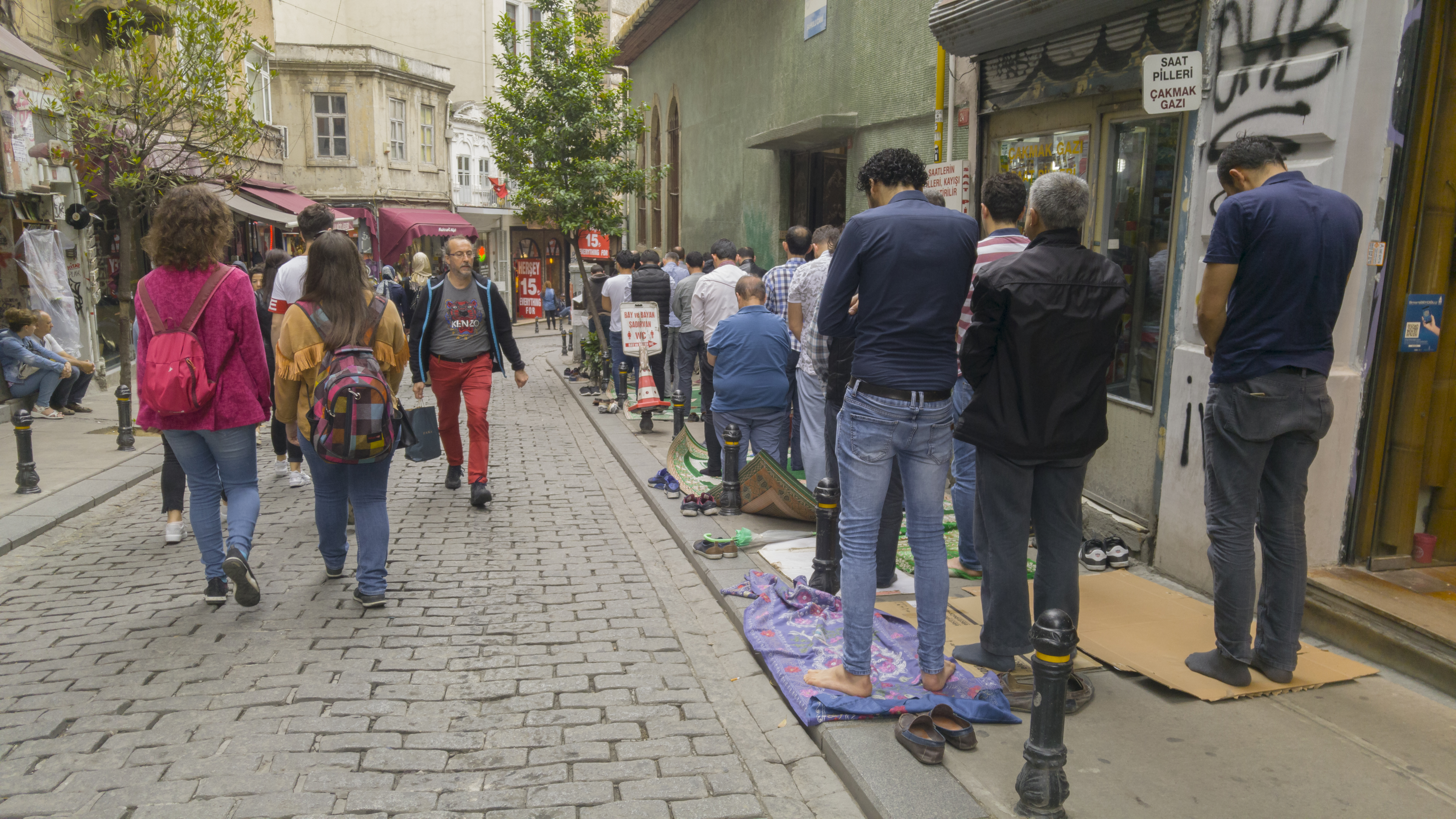|
Religiosity
The ''Oxford English Dictionary'' defines religiosity as: "Religiousness; religious feeling or belief. ..Affected or excessive religiousness". Different scholars have seen this concept as broadly about religious orientations and degrees of involvement or commitment. The contrast between "religious" and "" (superficially religious) and the concept of "strengthening" faith suggest differences in the intensity of religiosity. Scholars attempt to measure religiosity at the levels of individuals or groups, but differ as to what behaviors constitute religiosity. Sociologists of religion have observed that an individual's experience, beliefs, sense of belonging, and general behavior often are not congruent with their religious behavior, since there is much diversity in how one can be religious or not. Problems arise in measuring religiosity. For instance, measures of variables such as church attendance produce different results when different methods are used, such as traditional ... [...More Info...] [...Related Items...] OR: [Wikipedia] [Google] [Baidu] |
Sociology Of Religion
Sociology of religion is the study of the beliefs, practices and organizational forms of religion using the tools and methods of the discipline of sociology. This objective investigation may include the use both of Quantitative research, quantitative methods (surveys, polls, demographic and census analysis) and of Qualitative research, qualitative approaches (such as participant observation, interviewing, and analysis of archival, historical and documentary materials). Modern sociology as an academic discipline began with the analysis of religion in Émile Durkheim's 1897 suicide (Durkheim book), study of suicide rates among Catholic Church, Catholic and Protestantism, Protestant populations, a foundational work of social research which served to distinguish sociology from other disciplines, such as psychology. The works of Karl Marx (1818–1883) and Max Weber (1864–1920) emphasized the relationship between religion and the economic system, economic or social structure of soci ... [...More Info...] [...Related Items...] OR: [Wikipedia] [Google] [Baidu] |
Spirituality
The meaning of ''spirituality'' has developed and expanded over time, and various meanings can be found alongside each other. Traditionally, spirituality referred to a religious process of re-formation which "aims to recover the original shape of man", oriented at "the image of God" as exemplified by the List of founders of religious traditions, founders and sacred texts of the religions of the world. The term was used within early Christianity to refer to a life oriented toward Holy Spirit (Christianity), the Holy Spirit and broadened during the Late Middle Ages to include mind, mental aspects of life. In modern times, the term both spread to other religious traditions and broadened to refer to a wider range of experiences, including a range of Western esotericism, esoteric and religious traditions. Modern usages tend to refer to a subjective experience of a Sacredness, sacred dimension, and the "deepest values and meanings by which people live", often in a context separate from ... [...More Info...] [...Related Items...] OR: [Wikipedia] [Google] [Baidu] |
Religious Orientation
An individual's or community's religious orientation involves presumptions about the existence and nature of God or gods, religious prescriptions about morality and communal and personal spirituality. Such presumptions involve the study of psychology, ethics, sociology and anthropology. Psychology According to Whitley and Kite, researchers who were interested in studying the psychological effects of religion on prejudice initially studied the relationship between simple indicators of religiosity such as whether or not a person went to church and the level of prejudice that the person showed. They found that "religious involvement was consistently correlated with a variety of forms of prejudice."Whitley, B. E. & Kite, M. E. (2010). "The psychology of prejudice and discrimination". Belmont, CA. Wadsworth. These findings were not well received by religious leaders or the religious community in general. At this point there was a shift in the nature of the research. Instead o ... [...More Info...] [...Related Items...] OR: [Wikipedia] [Google] [Baidu] |
Church Attendance
Church attendance is a central religious practice for many Christians; some Christian denominations require church attendance on the Lord's Day (Sunday). The Catholic Church teaches that on Sundays and other holy days of obligation, the faithful are required to attend Mass. The Westminster Confession of Faith held by many Reformed Churches teaches first-day (Sunday) Sabbatarianism and the duty of church attendance on this day. Similarly, Methodist Church also requires attending "the public worship of God". The Lutheran theologian stated that church attendance is the "foundation for the Christian life" as "the Christian Bible and the sacraments provide the framework for the faith"; he also states that it is important for believers because it aids in the prevention of backsliding, as well as offers "the company of other believers". Until 1791, it was a legal requirement in the Kingdom of Great Britain to attend services of the Church of England (the state church) at least ... [...More Info...] [...Related Items...] OR: [Wikipedia] [Google] [Baidu] |
Gallup, Inc
Gallup, Inc. is an American multinational analytics and advisory company based in Washington, D.C. Founded by George Gallup in 1935, the company became known for its public opinion polls conducted worldwide. Gallup provides analytics and management consulting to organizations globally. In addition the company offers educational consulting, the CliftonStrengths assessment and associated products, and business and management books published by its Gallup Press unit. Organization Gallup is a private employee-owned company based in Washington, D.C., founded by George Gallup in 1939. Headquartered in The Gallup Building, it maintains between 30 and 40 offices globally, in locations including in New York City, London, Berlin, Sydney, Singapore, and Abu Dhabi, and has approximately 1,500 employees. In 2022, Jon Clifton became Gallup's CEO, replacing his father, Jim Clifton, who had been the CEO since 1998. Gallup, Inc. has no affiliation with Gallup International, a Swiss-based ... [...More Info...] [...Related Items...] OR: [Wikipedia] [Google] [Baidu] |
Faith
Faith is confidence or trust in a person, thing, or concept. In the context of religion, faith is " belief in God or in the doctrines or teachings of religion". According to the Merriam-Webster's Dictionary, faith has multiple definitions, including "something that is believed especially with strong conviction", "complete trust", "belief and trust in and loyalty to God", as well as "a firm belief in something for which there is no proof". Religious people often think of faith as confidence based on a perceived degree of warrant, or evidence, while others who are more skeptical of religion tend to think of faith as simply belief without evidence. In the Roman world, 'faith' (Latin: ) was understood without particular association with gods or beliefs. Instead, it was understood as a paradoxical set of reciprocal ideas: voluntary will and voluntary restraint in the sense of father over family or host over guest, whereby one party willfully surrenders to a party who could harm b ... [...More Info...] [...Related Items...] OR: [Wikipedia] [Google] [Baidu] |
Charismatic Movement
The charismatic movement in Christianity is a movement within established or mainstream denominations to adopt beliefs and practices of Charismatic Christianity, with an emphasis on baptism with the Holy Spirit, and the use of spiritual gifts (''charismata''). It has affected most denominations in the United States, and has spread widely across the world. The movement is deemed to have begun in 1960 in Anglicanism ( Episcopal Church) and spread to other mainstream Protestant denominations, including American Protestant both Lutherans and Presbyterians by 1962, and to Roman Catholicism by 1967. Methodists became involved in the charismatic movement in the 1970s. The movement was not initially influential in evangelical churches. Although this changed in the 1980s in the so-called Third Wave, the charismatic movement was often expressed in the formation of separate evangelical churches such as the Vineyard Movement—neo-charismatic organisations that mirrored the establish ... [...More Info...] [...Related Items...] OR: [Wikipedia] [Google] [Baidu] |
Belief
A belief is a subjective Attitude (psychology), attitude that something is truth, true or a State of affairs (philosophy), state of affairs is the case. A subjective attitude is a mental state of having some Life stance, stance, take, or opinion about something. In epistemology, philosophers use the term "belief" to refer to attitudes about the world which can be either truth value, true or false. To believe something is to take it to be true; for instance, to believe that snow is white is comparable to accepting the truth of the proposition "snow is white". However, holding a belief does not require active introspection. For example, few individuals carefully consider whether or not the sun will rise tomorrow, simply assuming that it will. Moreover, beliefs need not be ''occurrent'' (e.g., a person actively thinking "snow is white"), but can instead be ''dispositional'' (e.g., a person who if asked about the color of snow would assert "snow is white"). There are various ways tha ... [...More Info...] [...Related Items...] OR: [Wikipedia] [Google] [Baidu] |
Christian Doctrine
Christian theology is the theology – the systematic study of the divine and religion – of Christianity, Christian belief and practice. It concentrates primarily upon the texts of the Old Testament and of the New Testament, as well as on Christian tradition. Christian theologians use biblical exegesis, rationality, rational analysis and argument. Theologians may undertake the study of Christian theology for a variety of reasons, such as in order to: * help them better understand Christian tenets * make comparative religion, comparisons between Christianity and other traditions * Christian apologetics, defend Christianity against objections and criticism * facilitate reforms in the Christian church * assist in the evangelism, propagation of Christianity * draw on the resources of the Christian tradition to address some present situation or perceived need * education in Christian philosophy, especially in Neoplatonism, Neoplatonic philosophyLouth, Andrew. The Origins of the Ch ... [...More Info...] [...Related Items...] OR: [Wikipedia] [Google] [Baidu] |
Worship
Worship is an act of religious devotion usually directed towards a deity or God. For many, worship is not about an emotion, it is more about a recognition of a God. An act of worship may be performed individually, in an informal or formal group, or by a designated leader. Such acts may involve honoring. Etymology The word is derived from the Old English , meaning ''to venerate "worship, honour shown to an object or deity'',Bosworth and Toller, Anglo-Saxon Dictionary,weorþscipe which has been etymologised as "''worthiness'' or ''worth-ship"''—to give, at its simplest, worth to something. Worship in various religions Buddhism Worship in Buddhism may take innumerable forms given the doctrine of skillful means. Worship is evident in Buddhism in such forms as: guru yoga, mandala, thanka, yantra yoga, the discipline of the fighting monks of Shaolin, panchamrita, mantra recitation, tea ceremony, ganacakra, amongst others. Buddhist Devotion is an important part of the pra ... [...More Info...] [...Related Items...] OR: [Wikipedia] [Google] [Baidu] |
Pew Research Center
The Pew Research Center (also simply known as Pew) is a nonpartisan American think tank based in Washington, D.C. It provides information on social issues, public opinion, and demographic trends shaping the United States and the world. It also conducts public opinion polling, demographic research, random sample survey research, and panel based surveys, media content analysis, and other empirical social science research. The Pew Research Center states it does not take policy stances. It is a subsidiary of the Pew Charitable Trusts and a charter member of the American Association of Public Opinion Research's Transparency Initiative. History In 1990, the Times Mirror Company founded the Times Mirror Center for the People & the Press as a research project, tasked with conducting polls on politics and policy. Andrew Kohut became its director in 1993, and the Pew Charitable Trusts became its primary sponsor in 1996, when it was renamed the Pew Research Center for the Pe ... [...More Info...] [...Related Items...] OR: [Wikipedia] [Google] [Baidu] |








